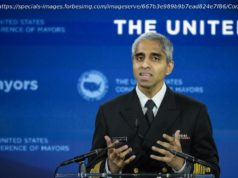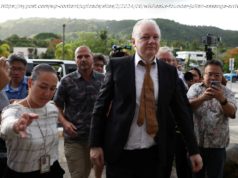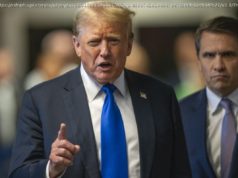Trump and his allies aggressively pushed to overturn the 2020 election results in Georgia – taking actions that could result in criminal charges.
Two days after Election Day in 2020, President Donald Trump’s eldest son traveled to the Georgia Republican Party headquarters in Atlanta to deliver a message.
The presidential race was still too close to call in the state and in the country. Georgia Republicans were scrambling to prepare for two runoff elections that would determine control of the U.S. Senate. But Donald Trump Jr. urged them to focus on another task: helping his father win the state by proving that widespread fraud had tainted the results.
If you do not support my dad 100 percent, we have a problem, Donald Trump Jr. told the group, a Trump campaign staffer familiar with the meeting testified to the House committee that investigated the violent attack on the U.S. Capitol on Jan. 6, 2021.
The state party chairman, David Shafer, emerged looking “like he had seen a ghost,” the staffer said.
The message was received. That evening, Republican leaders in Georgia held a rally-style news conference in support of Trump.
The same week, the president’s allies circulated a video falsely accusing a Georgia election worker of throwing away ballots, making her the immediate target of harassment and threats. And White House Chief of Staff Mark Meadows and others began evaluating a plan for how legislatures in states like Georgia could overturn the will of voters.
The rapid series of events kicked off an aggressive pressure campaign that only intensified as weeks passed and the results more and more firmly showed that Trump had lost.
In phone calls, speeches, tweets and media appearances, Trump and his allies pushed to overturn the 2020 election results in six swing states where certified results declared Joe Biden the winner, an effort that culminated in the Jan. 6, 2021, attack on the U.S. Capitol as Congress convened to confirm the results.
Nowhere was the effort more acute than in Georgia, where all of their strategies came together in a complex and multilayered effort that unfolded against the hyperpartisan backdrop of two ongoing U.S. Senate races.
Those close to Trump prodded state officials to identify fraud that would cast Biden’s victory in doubt. In the process, they personally targeted individual election workers with false claims of cheating, unleashing waves of threats, and amplified conspiracy theories about rigged machines that persist today. In the end, after Trump sought to use every lever of power to overturn the results, top state Republicans stood in his way, refusing to buckle under the pressure.
While much of what happened in Georgia has surfaced in leaked recordings, court proceedings and congressional testimony, the fullest story yet could emerge this week, when the district attorney in Fulton County, home to Atlanta, is widely expected to seek an indictment of Trump and those who supported his efforts there.
Trump has repeatedly denounced the criminal investigations into his actions around the 2020 election and has continued to claim without evidence, as recently as last week, that widespread fraud tainted his loss. Regarding Georgia, he and his allies have maintained that they were following the advice of counsel and were protected by the First Amendment as they advocated for investigations into alleged voting irregularities.
But there is little doubt that Georgia was a consuming focus of the president and his allies in the final weeks of 2020.
Their efforts involved scores of people – lawyers, political operatives, local GOP officials, senior White House officials and even the Justice Department.
On Nov. 13, the same day news organizations projected that Joe Biden had won Georgia, Sen. Lindsey O. Graham (R-S.C.) called Secretary of State Brad Raffensperger (R) and peppered him with questions about absentee ballots in the heavily Democratic Atlanta area. Ray S. Smith III, a lawyer for Trump, later sent a letter with similar concerns. Soon the state launched an audit of absentee ballot signatures.
A few weeks later, two lawyers pushing to overturn Trump’s loss – Rudy Giuliani and John Eastman – met with Georgia state senators and urged them to disregard the election results and formally back a slate of pro-Trump electors.
Robert Sinners, a Trump campaign staffer, then helped Giuliani and Eastman bring together the pro-Trump slate with the help of Shafer and Shawn Still, then the state party finance chair. Smith, the Trump lawyer, attended the meeting.
In late December, Meadows traveled to the Atlanta suburbs to see the signature audit himself and meet the state’s chief elections investigator, Frances Watson. The next day, Trump called Watson – one of numerous calls he made to Georgia officials.
Trump also called the state’s top Republican leaders Gov. Brian Kemp, Lt. Gov. Geoff Duncan, Attorney General Chris Carr and House Speaker David Ralston.
On Jan. 2, 2021 – just days before Congress was set to certify the election results – Trump called Raffensperger, the state’s top election official, and said he wanted to “find” the votes needed to reverse Biden’s narrow margin of victory in Georgia. Trump suggested that thousands of invalid votes could be found by scrutinizing absentee ballots in the Atlanta area.
“So look, all I want to do is this,” Trump said, “I just want to find 11,780 votes, which is one more than we have because we won the state.”
News of that explosive conversation, first reported by The , quickly caught the attention of Fani T. Willis, the Atlanta-area district attorney who launched a criminal investigation in early February 2021 that has since expanded to the sprawling activities of Trump and his allies not only in Georgia but also in other states where he contested the results. On Monday night, a Georgia grand jury returned an indictment after hearing witnesses testify about efforts by Trump and his allies to overturn Biden’s victory. The indictment has not been publicly released and it is not known who is charged.
The Justice Department is also examining criminal wrongdoing related to the 2020 election, with federal prosecutors announcing charges against Trump on Aug. 1 while continuing to issue subpoenas and gather evidence.
Spokespersons or lawyers for Trump, Donald Trump Jr., Giuliani, Eastman and Meadows declined to comment for this article or did not respond.
Willis, a Democrat, and her investigators have spent nearly 2 ½ years piecing together what happened in their state after Trump lost – and which laws maybe have been broken along the way. Willis’s office declined to comment for this article.
At Trump’s insistence, his allies launched a mad chase of every accusation of fraud they could find, big or small. Some of the more fantastical claims came directly from Trump and his allies, who amplified baseless accusations on conservative media and unleashed new waves of outlandish tips from rank-and-file Republicans.
They spread false claims that thousands of mail ballots should be discarded because of questionable signatures, that a mother-daughter team of election workers in Atlanta had triple-tallied counterfeit votes, that voting machines had been programmed to flip votes from one candidate to another.
One claim came from a local election official in rural Coffee County, Ga., named Misty Hampton, who said on Nov. 10, 2020, in a public meeting of her local elections board that machines made by Dominion Voting Systems could flip votes from one candidate to the next.
Sinners, under orders to look under every stone for possible fraud, got wind of Hampton’s remarks and emailed her the same day seeking more information. Although he would quickly determine that her claim and many others like it were bogus, that didn’t stop Trump allies from pursuing it, even arranging, with Hampton’s help, to examine the equipment in Coffee County – a violation of state law.
As the days wore on and more and more key states certified their results for Biden, Trump struggled to persuade his campaign lawyers to continue contesting results.






